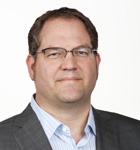When you care for more than 149,000 patients across the country, your technology infrastructure needs to go beyond data centers and help desks. The IT team at DaVita Inc., a leading kidney-care provider, knows what it takes to tackle those extra critical-path responsibilities on their plate.
For companies in other industries, getting money from customers is straightforward. But because health-care providers don’t bill patients directly, DaVita must leverage advanced technology to complete the billing process and keep revenue flowing. “We have a lot of complex systems to deal with working with insurance companies,” says Anthony Gabriel, DaVita’s CIO. “Also, many of our patients have multiple insurance companies that we have to bill in the right order.”
For billing to go smoothly, claims must be formatted correctly, and the DaVita team needs to know how much to collect from each payer along the way. It’s something patients think about often, but Gabriel says it’s important that these kinds of issues don’t interfere with treatment. “We do a good job of isolating those complexities from our clinical caregivers, and keeping it within our revenue-cycle organization,” Gabriel explains. “With all the complexities of health-care billing, we try to keep it simple out in our dialysis centers, so they can really focus on taking care of the patients.”
While clinicians in each dialysis center are insulated from most of the billing activities, a number of other systems are in place to support them in their mission to serve patients. “We have a custom product that we built ourselves, called Falcon Dialysis,” Gabriel says. Released earlier this year, the platform is in all of the company’s more than 1,800 centers, and enables clinicians to capture critical information about every patient interaction. “Also, if a patient transfers from one place to another, we have accurate documentation about what was done,” Gabriel explains.
Patient data has value beyond what’s stored in electronic health records, though, and Gabriel says that’s where the true power of DaVita’s systems shines. “We have decision-support models in a variety of forms for our interdisciplinary team, including nurses, dietitians, social workers, and physicians in the centers.”
There are systems in place to help adjust medications, plus provide specialized support by helping clinicians identify and treat the patients with the most critical needs in each center. Even the nearly 150 senior-level nurses on the clinical-support services team have a specialized system tailored to their role. “They get reporting across all their centers, so that they can go in and assist,” Gabriel says. “That kind of interaction wouldn’t be possible without the technology and systems that are in our centers.”
DaVita’s objectives are clear and concise. “Our mission is to be the provider, partner, and employer of choice,” Gabriel says. “We have a vision to be the greatest health-care community the world has ever seen.” The goals of the IT group align with the organization’s overall objectives, and Gabriel’s team works in concert with the field and clinical-operations leadership. “They get to interact with each of the productswe build,” Gabriel says. “And it’s really by working in collaboration with them that we help achieve better clinical outcomes.”

